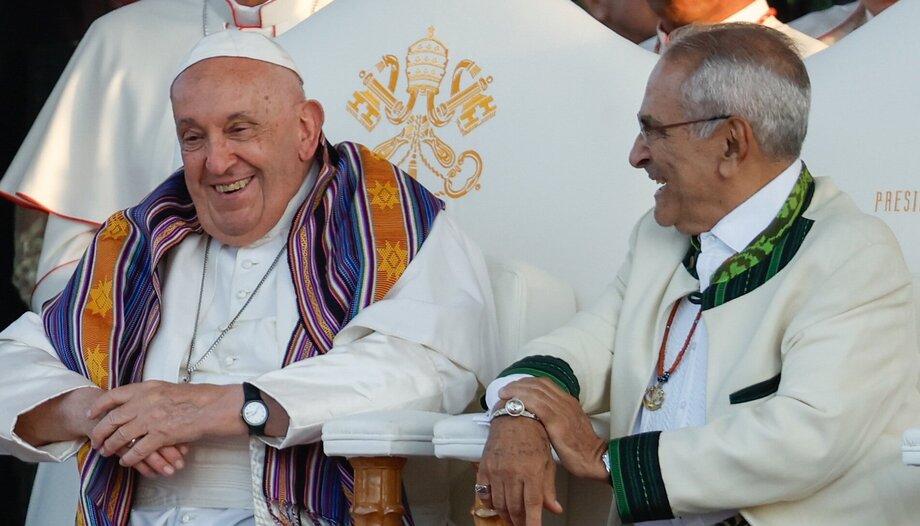On Monday, September 9, Pope Francis left Papua New Guinea and began a historic visit to East Timor, a small but deeply Catholic country in Southeast Asia, rich in history and cultural traditions. He will remain there until Wednesday, September 11, on the third leg of his apostolic journey.
Final stages in Papua New Guinea
The seventh day of the papal trip began early in the morning in Papua New Guinea, with the meeting with the youth that took place at the Papua New Guinea stadium. Sir John Guise of Port Moresby. The event was an outpouring of joy and celebration, with around 20,000 faithful welcoming the Pontiff with songs, traditional dances and testimonies.
The head of the Youth Commission, the Bishop of Kimbe, opened the meeting with a warm welcome. Then, the young people present offered various theatrical and musical performances, sharing stories of faith and hope.
During his speech, Pope Francis encouraged young people to live with faith and courage, and to become witnesses of the Gospel in their communities. "I will tell you one thing: I am happy for these days spent in this country, where sea, mountains and tropical forests coexist; but above all a young country inhabited by many young people!
But I ask you: what is the language that fosters friendship, that tears down the walls of division and opens the way for all of us to enter into a fraternal embrace?" and to the answer of a young man: "love", the Pope added: "And what is there against love? Hatred. But there is also something perhaps worse than hatred: indifference towards others." And he concluded by thanking "all those who prepared this beautiful meeting."
Shortly after, the Pope moved to Jacksons International Airport in Port Moresby, where a farewell ceremony was held to bid farewell to Papua New Guinea. After greeting local leaders, the Holy Father departed for Dili, capital of East Timor.
Welcome to East Timor
Pope Francis' flight passed through Papua New Guinea, Australia and Indonesia before landing at President Nicolau Lobato International Airport in Dili at 2:10 p.m. local time.
Dili, a city of approximately 277,000 inhabitants, is the capital and largest city of East Timor, a country with a complex history, which gained independence from Portugal in 1975, then was invaded in 1976 by Indonesia until May 20, 2002, when it finally declared its independence.
Upon his arrival, Pope Francis was greeted by the President of the Republic, José Manuel Ramos-Horta, and the Prime Minister, as well as two children dressed in traditional costumes who offered him flowers and a traditional necklace (tais).
Meeting at the presidential palace
After a brief transfer to the Apostolic Nunciature, located near the historic church of Sant'António de Motael, the Pope had an official meeting with the President of East Timor at the Nicolau Lobato Presidential Palace at around 6:30 p.m. (local time).
The country received the Pope with a solemn welcoming ceremony with national anthems, flags and cannon fire. Twenty-nine children dressed in traditional costumes received the Pontiff with flowers and another traditional scarf (tais), a symbol of respect and friendship.
Meeting with authorities, civil society and the diplomatic corps
In the golden book, the Pope wrote his dedication in Spanish: "I thank the Lord who brought me to East Timor and I encourage his people to live the joy of faith in harmony and dialogue with the culture. The best and most beautiful thing that East Timor has is its people. I bless you from the bottom of my heart. Francis, September 9, 2024".
In his first speech read in Spanish, Pope Francis recalled how the first Dominican missionaries arrived in the country from Portugal in the 16th century, "bringing with them Catholicism and the Portuguese language".
He also added that "Christianity is inculturation". A doctrine "that promotes the development of people and especially of the poorest".
In a country with so many young people, the Holy Father suggested "that the first area in which we must invest is education, the family and the school, an education that puts children and young people at the center and promotes their dignity."
He concluded his words by entrusting them to the "protection of the Immaculate Conception, his heavenly patroness, invoked under the title of the Virgin of Aitara".
"May it always accompany you and help you in the mission of building a free, democratic and solidary country -he concluded- where no one feels excluded and everyone can live in peace and dignity," he said.
At the end of the meeting, the Pope gave his blessing to about a thousand people, employees of the Presidential Palace and their families who gathered in the courtyard in front of the main entrance. After a group photo, the President of the Republic bid farewell to the Pope, thus concluding a day full of encounters and significance.







